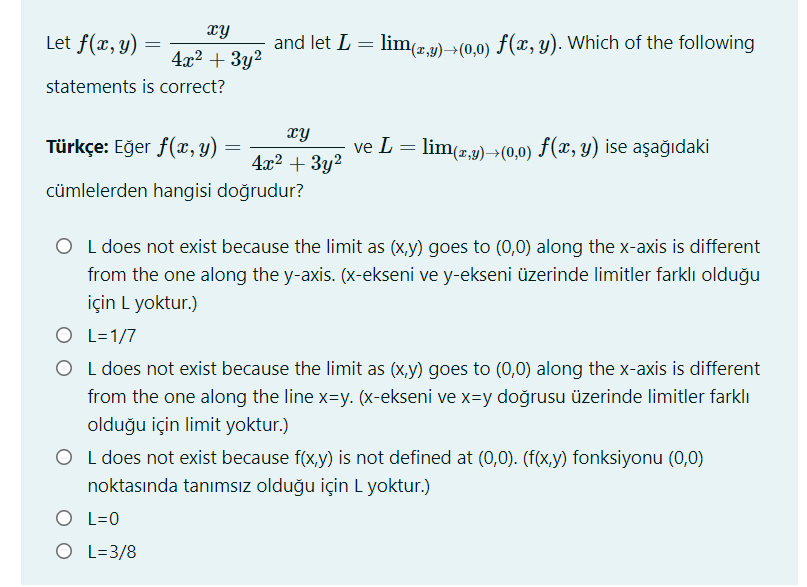xY Let f(x, y) and let L = lim(z,9)→(0,0) f(x, y). Which of the following 4x2 + 3y2 statements is correct? xY Türkçe: Eğer f(x, y) ve L = lim(r,y)→(0,0) F(x, y) ise aşağıdaki 4x² + 3y² cümlelerden hangisi doğrudur? O L does not exist because the limit as (x,y) goes to (0,0) along the x-axis is different from the one along the y-axis. (x-ekseni ve y-ekseni üzerinde limitler farklı olduğu için L yoktur.) O L=1/7 O L does not exist because the limit as (x,y) goes to (0,0) along the x-axis is different from the one along the line x=y. (x-ekseni ve x=y doğrusu üzerinde limitler farklı olduğu için limit yoktur.) O L does not exist because f(x,y) is not defined at (0,0). (f(x,y) fonksiyonu (0,0) noktasında tanımsız olduğu için L yoktur.) O L=0 O L=3/8
xY Let f(x, y) and let L = lim(z,9)→(0,0) f(x, y). Which of the following 4x2 + 3y2 statements is correct? xY Türkçe: Eğer f(x, y) ve L = lim(r,y)→(0,0) F(x, y) ise aşağıdaki 4x² + 3y² cümlelerden hangisi doğrudur? O L does not exist because the limit as (x,y) goes to (0,0) along the x-axis is different from the one along the y-axis. (x-ekseni ve y-ekseni üzerinde limitler farklı olduğu için L yoktur.) O L=1/7 O L does not exist because the limit as (x,y) goes to (0,0) along the x-axis is different from the one along the line x=y. (x-ekseni ve x=y doğrusu üzerinde limitler farklı olduğu için limit yoktur.) O L does not exist because f(x,y) is not defined at (0,0). (f(x,y) fonksiyonu (0,0) noktasında tanımsız olduğu için L yoktur.) O L=0 O L=3/8
Advanced Engineering Mathematics
10th Edition
ISBN:9780470458365
Author:Erwin Kreyszig
Publisher:Erwin Kreyszig
Chapter2: Second-order Linear Odes
Section: Chapter Questions
Problem 1RQ
Related questions
Question

Transcribed Image Text:hx
Let f(x, y)
and let L = lim(z,9)>(0,0) f(x, y). Which of the following
4x2 + 3y2
statements is correct?
xy
Türkçe: Eğer f(x, y)
ve L = lim(z9) (0,0) F(x, y) ise aşağıdaki
4x2 + 3y2
cümlelerden hangisi doğrudur?
O L does not exist because the limit as (x,y) goes to (0,0) along the x-axis is different
from the one along the y-axis. (x-ekseni ve y-ekseni üzerinde limitler farklı olduğu
için L yoktur.)
O L=1/7
O L does not exist because the limit as (x,y) goes to (0,0) along the x-axis is different
from the one along the line x=y. (x-ekseni ve x=y doğrusu üzerinde limitler farklı
olduğu için limit yoktur.)
O L does not exist because f(x,y) is not defined at (0,0). (f(x,y) fonksiyonu (0,0)
noktasında tanımsız olduğu için L yoktur.)
O L=0
O L=3/8
Expert Solution
This question has been solved!
Explore an expertly crafted, step-by-step solution for a thorough understanding of key concepts.
Step by step
Solved in 2 steps with 2 images

Knowledge Booster
Learn more about
Need a deep-dive on the concept behind this application? Look no further. Learn more about this topic, advanced-math and related others by exploring similar questions and additional content below.Recommended textbooks for you

Advanced Engineering Mathematics
Advanced Math
ISBN:
9780470458365
Author:
Erwin Kreyszig
Publisher:
Wiley, John & Sons, Incorporated

Numerical Methods for Engineers
Advanced Math
ISBN:
9780073397924
Author:
Steven C. Chapra Dr., Raymond P. Canale
Publisher:
McGraw-Hill Education

Introductory Mathematics for Engineering Applicat…
Advanced Math
ISBN:
9781118141809
Author:
Nathan Klingbeil
Publisher:
WILEY

Advanced Engineering Mathematics
Advanced Math
ISBN:
9780470458365
Author:
Erwin Kreyszig
Publisher:
Wiley, John & Sons, Incorporated

Numerical Methods for Engineers
Advanced Math
ISBN:
9780073397924
Author:
Steven C. Chapra Dr., Raymond P. Canale
Publisher:
McGraw-Hill Education

Introductory Mathematics for Engineering Applicat…
Advanced Math
ISBN:
9781118141809
Author:
Nathan Klingbeil
Publisher:
WILEY

Mathematics For Machine Technology
Advanced Math
ISBN:
9781337798310
Author:
Peterson, John.
Publisher:
Cengage Learning,

